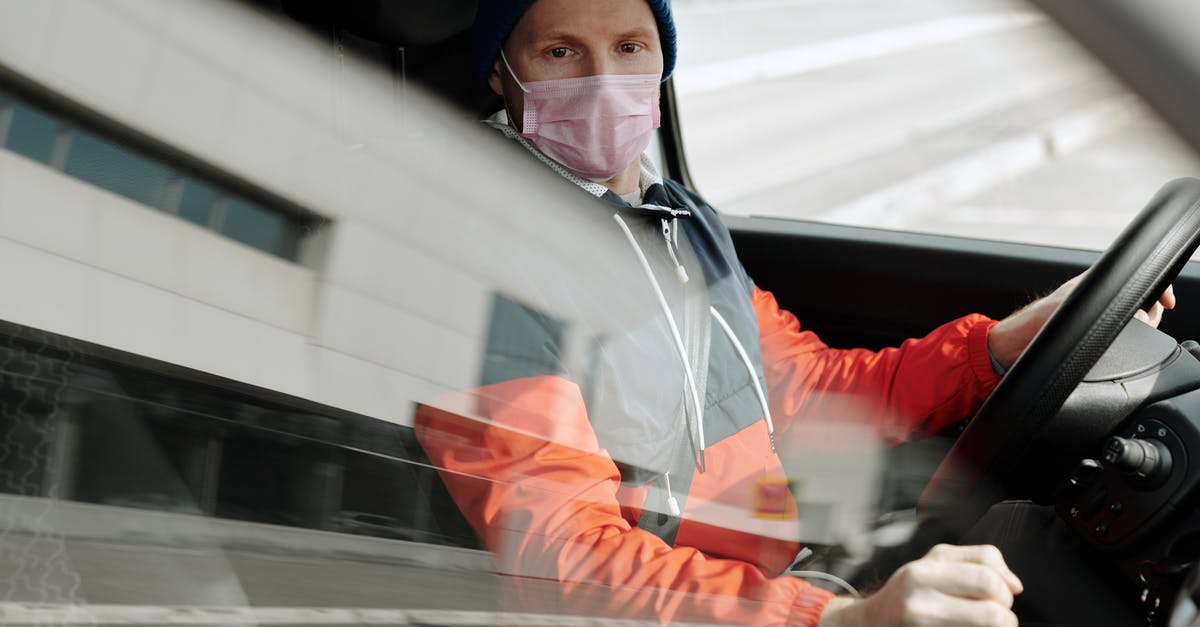Coronavirus affected co-passenger; what to do?

I am flying this week from Munich to London, and Bavaria just got the first contaminated person, who now has the Coronavirus 2019-nCoV after interacting with Chinese colleague. Two cases of the novel coronavirus have been confirmed in the UK, and the number of cases in Germany has grown. Moreover, the Coronavirus has now been declared a global health emergency by WHO.
I got a bunch of emails from SOS International and such, on what methodology I should follow to mitigate the risk of getting infected, but none of them addresses the following (hopefully extreme) hypothetical scenario:
I go to my seat, and I suspect the person next to me (or in neighboring seats) has the Coronavirus related symptoms (high fever, short breath, etc.). How should I react, without being too paranoid?
Go in the back to secretly communicate that to the flight attendant, and request a seat change?
Update (Feb 2): I am now in Munich airport, and both pharmacies (before and after security check) have no typical plastic masks (sold-out). They only have some conical-sized ones. The airport does not provide masks (asked in the Information). I advise you to buy a typical plastic mask before coming to the airport.
Best Answer
You are already being too paranoid for right now . Though this may change if Wuhan Corona virus becomes far more widespread.
Apart from the very small probability of coming into contact with a Wuhan Coronavirus carrier unless you are in/around Wuhan as mentioned in another answer you need to consider the following:
300,000 to 650,000 people die from Flu each year. Would you be at all considering raising the alarm to cabin crew if you suspected the person next to you had flu? All you would be doing is creating hysteria in possibly the worst place for it to happen - an aircraft cabin.
Right now (end Jan 2020) Wuhan CoronaVirus is much less deadly than SARS and MERS were and is far less likely to kill you personally in Munich or London than Flu would*.
- Assumming you are a fit adult of young to middle age - its also vanishingly unlikely that you will be killed by Flu.
Instead of speculating around unlikely (at this point in time) scenarios start educating yourselves and others about what the actual risks are.
So based on this site
Wuhan Coronavirus may spread more easily than flu (exactly how much is still uncertain), will kill more easily than flu, but not SARS or MERS.
Right now there are are 2 major worries about CoronaVirus - the fact that it may be contagious whilst the patient shows no symptoms, and that it seems to spread relatively easily for a droplet-borne virus - BUT at time of writing - neither of these things have been confirmed with statistical rigour.
In short - if you are flying you way more have more chance of sitting next to someone with flu than sitting next to someone suffering from Wuhan Coronavirus. This last statement is a WAG and lacks statistical rigour - but hopefully it makes the point.
Bookmark the site above and then start worrying if the number of cases reaches the 100,000 mark.
Bear in mind the media exists (in part) to sell advertising via manipulation of your emotions - particularly fear.
Right now there is nothing to suggest that WCV is going to be much much worse than SARS or MERS were. Not to trivialise those deaths but to put into context their minimal global impact to the average human.
One tip I use - change the headline to something more prosaic - at time of writing WuhanCorona Virus has killed 132 people since December 2019. In 2018 an average of 3056 people died in car crashes in the US. Source
Would you be worrying as much if you saw the headline 132 die from Virus, vs 132 die from Driving?
One last thought : The human brain is appalling at judging relative risk - always bear this in mind.
Pictures about "Coronavirus affected co-passenger; what to do?"



Infodemic: Coronavirus and the fake news pandemic
More answers regarding coronavirus affected co-passenger; what to do?
Answer 2
Like other coronaviruses – such as the common cold – the virus is spread via droplets when a person coughs or sneezes. It can also be spread when someone touches a contaminated surface such as a door handle.
I'm not a doctor but my mom is a biologist who works for the State Laboratory in São Paulo doing analysis in blood, feces, and other fluids for research of diseases like dengue and tuberculosis.
According to her, the best method to prevent an infection is to always sanitize your hands, never to touch your eyes or mouth, and to avoid direct contact with people such as by shaking hands, talking too close to them, and so on. A mask would prevent any saliva from getting in contact with your mouth and a pair of sanitary glasses would do the same for your eyes, but those are quite uncomfortable to use for long periods. Gloves are only valid if you frequently discard them because if you touch a contaminated surface using gloves and scratch your eye, the contamination will happen anyway.
When we had the swine flu in Brazil the government and private sector installed a lot of hand sanitizer dispensers in schools, supermarkets — almost everywhere. And people started carrying a small bottle of hand sanitizer in their pockets or purses, something that still happens today.
Answer 3
Go in the back to secretly communicate that to the flight attendant, and request a seat change?
If a passenger told a flight attendant that they suspected another passenger had a deadly contagious disease, the flight crew, if they believed the risk was real, they would immediately take steps to protect the passengers as a whole and the safety of the flight as a whole. Changing the seat of one passenger does nothing to improve the overall safety of the flight. A crew who felt the danger was real would not have attention to spare to swap the seat of one passenger who felt their personal safety was more important, though they might humor someone they thought was over-reacting by changing their seat.
If the aircraft were empty enough (rare these highly optimized days) they might create a buffer zone of empty seats around the affected passenger. If there were only a few empty seats away from the suspected carrier, priority would certainly go to the elderly, children, pregnant women, immunocompromised people, etc.
But the correct first step is definitely to discreetly notify a flight attendant of your concerns.
After that, the best you can do to protect yourself is hand sanitizer, turn to the wall, wear a mask, pray to the higher power of your choice...
(Note: Yes, I'm mostly serious about the prayer, as it can be useful to help people of faith keep calm after they have taken all practical tangible steps.)
Answer 4
There is lot of misinformation going around on this; so lets break it down. First off, at the time of writing the chances that someone on a Munich-London flight has the Coronavirus are extremely remote. There are currently a dozen or so cases in Bavaria, in a population of millions.
Second, you will not be able to tell if the person has “the symptoms”, or are you going to take their temperature? If someone is coughing and sneezing, the most likely chance is that they have a common cold.
If they have fever, it is still more likely to be influenza than coronavirus.
Of course you will still want to avoid contracting any disease, especially influenza, which is also serious. The measures are kind of always the same: Wash your hands often, especially after being in public places, and don’t touch your face. Also, it is a good idea to get vaccinated against the flu (though it doesn’t help against the coronavirus).
If there is space, you may politely ask the crew to be restated; nobody enjoys sitting next to a sick person.
And if you believe the person next to you to be seriously unwell, for any reason, you should inform the crew so that they can assess if the passenger is fit to fly.
In short: You should do the same things that you always do when sitting next to a “sick” person.
Should the virus spread more widely, you should follow the advice of the official health authorities - and not stuff that you read on the internet.
Addition
The original answer made sense at the time (the cases in Munich were completely contained at that point, there was almost zero chance of meeting someone infected).
Things have changed now. If you still fly, and someone is showing symptoms there may be a fairly high chance of them being infected. In which case you should ask the flight crew, and ask to be re-seated. Consider yourself at risk, and self-quarantine for one or two weeks; if you are in a vulnerable group contact your doctor and try to get tested.
That said, if you're further away from the person, it is unlikely the virus ever gets to you before getting sucked up by the air filters.
Answer 5
Besides all the fear-mongering in the media - please consider the travel-warnings of the CDC.
Just take the suggested precautions and bring your own medical face-mask to MUC terminal.
Latex gloves can also help with avoiding to touch the face accidentally (this requires training).
And if you should notice suspect it after the take-off, contact a flight attendant discretely.
In case the risk should appear too high, consider individual transport through the EuroTunnel. The ferry from Calais to Dover is less secure, because you'll be on-board while in transit, not in a car.
Answer 6
The correct answer is that you do nothing.
You are the one choosing to use air travel, you are the one taking the risk that you will be infected by all manner of airborne pathogens which are circulated and recycled through the pressurised cabin by the A/C and oxygen.
Personally, I have never taken a long-haul flight without contracting at least a common cold. It's just one of the perks of being in a metal tube with 300-400 other humans breathing their germs all over you.
Whether you are sitting next to someone on a flight with a virus or sitting 10 rows back from them, you are exposed to the same level of risk.
So just sit in your seat, stop worrying about what other people are doing, and stop thinking you can diagnose someone's symptoms just by looking at them. You can't, and even if you could it doesn't matter where you're sat in the airplane, you'll be infected anyway.
Sources: Stack Exchange - This article follows the attribution requirements of Stack Exchange and is licensed under CC BY-SA 3.0.
Images: Gustavo Fring, Gustavo Fring, Gustavo Fring, Norma Mortenson
